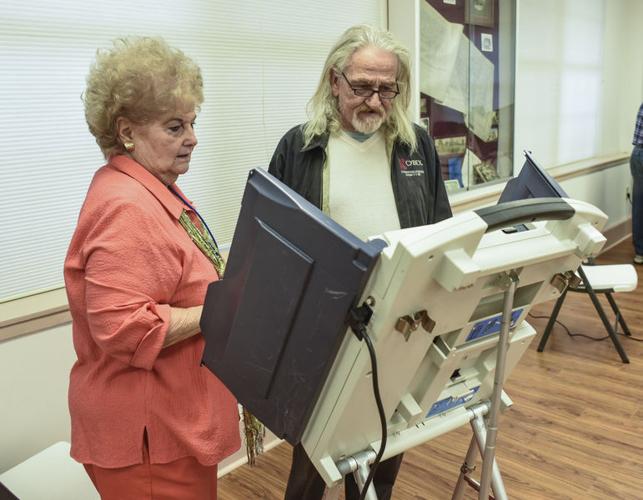HARRISBURG — Counties buying voting machines that allow voters to fill out paper ballots are paying half what counties buying tablet-based voting technology are paying, according to an analysis released Thursday by the University of Pittsburgh.
Researchers examined the costs paid by 31 counties for voting machines, as counties across the state move to replace their election equipment before the 2020 presidential election.
In total, the counties are calculated to spend $69 million on those systems.
The state has told the counties to replace their voting machines with new equipment with paper ballots before the 2020 presidential election. That move was prompted by a settlement to a lawsuit filed by former Green Party presidential candidate Jill Stein after the 2016 election.
The average cost for the all ballot-marking device equipment — where voters make their selections on a computer screen — was $23.35 per voter in counties that went that route, compared to $12.51 per voter for the hand-marked paper ballot equipment, according to the report. In counties with hand-marked paper ballots, the polling places typically have a ballot-marking device available for use by voters with disabilities, said Christopher Deluzio, policy director for the University of Pittsburgh Institute for Cyber Law, Security and Research.
Not surprisingly, 24 of the 31 counties have opted to buy the hand-marked paper ballot systems.
Philadelphia and six other counties — Berks, Bradford, Crawford, Cumberland, Northampton and Union — selected the ballot-marking device equipment, according to the report.
Deluzio said that officials in counties that selected the more expensive equipment justified the decision by saying the equipment was more like the equipment they’d already been using.
“Features, ease of use, and prior relationship with vendors were also frequently cited reasons for choosing a system. In some counties, expert opinion and public feedback made a big difference. But by far and away, cost has been the biggest part of these decisions,” said Kevin Skoglund, co-founder of Citizens for Better Elections, an advocacy group that worked with the Pitt researchers on this study.
Deluzio made it clear that he thinks the hand-marked paper ballots are the better option. He hopes the report convinced elected officials in the counties that have not already selected equipment to go with the hand-marked paper ballot equipment.
“It’s not often that politicians have the opportunity to make a choice that is both superior and less expensive, but that’s the case,” Deluzio said.
In addition to the cost, the hand-marked paper ballots have other advantages. For one, if there is an equipment breakdown, voters can continue to fill out ballots while the equipment is repaired, Deluzio said. With the computer-based voting machines, every time a machine breaks down, that’s one less machine available for voting, which can lead to voters getting stuck in line on Election Day, he said. Also, when voters make their selections on computer equipment, they need to double-check the paper ballot to make sure it accurately captured the votes they intended to make, Deluzio said. Research shows that voters often don’t really double-check the information or they don’t look closely enough to notice errors, he said.
When the voter makes a selection on the paper ballot, there’s isn’t the need to double-check for accuracy in the same way, he said.
Seventeen of the state’s 67 counties have voting machines had already been using voting systems that included paper ballots before the governor’s order to replace all the voting equipment, according to the Department of State. But those counties were covered by the same replacement mandate.
Deluzio said that while those counties have had paper ballot systems, the new equipment approved by the state is more secure.
Snyder County is one of the states that already had paper ballot systems in place for voting. The county commissioners voted two weeks ago to spend $229,000 on new machines – a hand-marked paper ballot system.
Pat Nace, election director for Snyder County, said that she agrees that the new systems are more secure than the voting machines they’ve been using.
“The ballots are handled less,” with the new voting equipment than they were with the old machines, she said.


